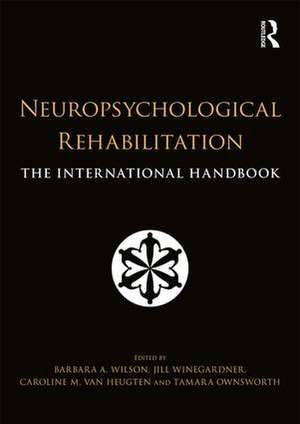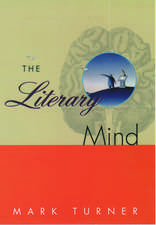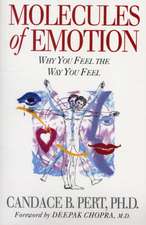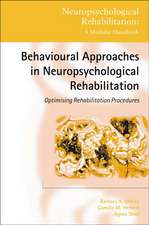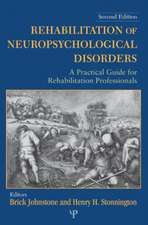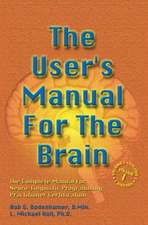Neuropsychological Rehabilitation: The International Handbook
Editat de Barbara Wilson, Jill Winegardner, Caroline van Heugten, Tamara Ownsworthen Limba Engleză Paperback – 20 iun 2017
Divided into sections, the first part looks at general issues in neuropsychological rehabilitation including theories and models, assessment and goal setting. The book goes on to examine the different populations referred for neuropsychological rehabilitation and then focuses on the rehabilitation of first cognitive and then psychosocial disorders. New and emerging approaches such as brain training and social robotics are also considered, alongside an extensive section on rehabilitation around the world, particularly in under-resourced settings. The final section offers some general conclusions and an evaluation of the key issues in this important field.
This is a landmark publication for neuropsychological rehabilitation. It is the standalone reference text for the field as well as essential reading for all researchers, students and practitioners in clinical neuropsychology, clinical psychology, occupational therapy, and speech and language therapy. It will also be of great value to those in related professions such as neurologists, rehabilitation physicians, rehabilitation psychologists and medics.
| Toate formatele și edițiile | Preț | Express |
|---|---|---|
| Paperback (1) | 493.54 lei 3-5 săpt. | +42.59 lei 7-13 zile |
| Taylor & Francis – 20 iun 2017 | 493.54 lei 3-5 săpt. | +42.59 lei 7-13 zile |
| Hardback (1) | 1029.00 lei 6-8 săpt. | |
| Taylor & Francis – 20 iun 2017 | 1029.00 lei 6-8 săpt. |
Preț: 493.54 lei
Preț vechi: 536.46 lei
-8% Nou
Puncte Express: 740
Preț estimativ în valută:
94.44€ • 98.60$ • 78.16£
94.44€ • 98.60$ • 78.16£
Carte disponibilă
Livrare economică 15-29 martie
Livrare express 01-07 martie pentru 52.58 lei
Preluare comenzi: 021 569.72.76
Specificații
ISBN-13: 9781138643116
ISBN-10: 1138643114
Pagini: 626
Ilustrații: 33
Dimensiuni: 174 x 246 x 40 mm
Greutate: 1.07 kg
Ediția:1
Editura: Taylor & Francis
Colecția Routledge
Locul publicării:Oxford, United Kingdom
ISBN-10: 1138643114
Pagini: 626
Ilustrații: 33
Dimensiuni: 174 x 246 x 40 mm
Greutate: 1.07 kg
Ediția:1
Editura: Taylor & Francis
Colecția Routledge
Locul publicării:Oxford, United Kingdom
Public țintă
Academic and PostgraduateCuprins
Section One: General Issues in Neuropsychological Rehabilitation
Introduction
Chapter 1: The Development of Neuropsychological Rehabilitation: An Historical Examination of Theoretical and Practical Issues
Chapter 2: Evidence-Based Treatment
Chapter 3: Mechanisms of Recovery After Acquired Brain Injury
Chapter 4: Assessment for Neuropsychological Rehabilitation Planning
Chapter 5: Goal Setting in Rehabilitation
Section Two: Populations Referred for Neuropsychological Rehabilitation
Chapter 6: Adults with Non-Progressive Brain Injury
a) Traumatic Brain Injury
b) Stroke
c) Encephalitis
d) Anoxia
e) Epilepsy
Chapter 7: Adults with Progressive Conditions
a) Dementia
b) Multiple Sclerosis
c) Parkinson’s Disease
d) Huntington’s Disease
e) Brain Tumours
Chapter 8: Children with Traumatic Brain Injury
Chapter 9: Other Neurological Conditions Affecting Children
Chapter 10: People with Disorders of Consciousness
Chapter 11: Neuropsychological Rehabilitation for Psychiatric Disorders
Chapter 12 Other Populations Seen for Rehabilitation
a) HIV
b) Blast Injuries
Section Three: Rehabilitation of Cognitive Disorders
Chapter 13: Rehabilitation of Slowed Information Processing
Chapter 14: Rehabilitation of Attention Disorders
a) Adults
b) Children
Chapter 15: Rehabilitation of Working Memory Disorders
Chapter 16: Rehabilitation of Memory Disorders in Adults and Children
Chapter 17: Rehabilitation of Executive Functions
Chapter 19: Rehabilitation of Visual Perceptual and Visual Spatial Disorders in Adults and Children
Chapter 20: Rehabilitation of Apraxia in Adults and Children
Chapter 21: Managing Acquired Social Communication Disorders
Chapter 22: Rehabilitation of Social Cognition Disorders
Chapter 23: Managing Disorders of Social and Behavioural Control and Disorders of Apathy
Nick Alderman and Caroline Knight
Chapter 24: Rehabilitation of Challenging Behaviour in Community Settings: The Empowerment Behavioural Management Approach (EBMA)
Section Four: Rehabilitation for Psychosocial Disorders
Chapter 25: Cognitive Behavioural Therapy for People with Brain Injury
Chapter 26: Third Wave Cognitive and Behavioural Therapies: Compassion Focussed Therapy, Acceptance and Commitment Therapy and Positive Psychology for People with Brain Injury
Chapter 27: Managing Self-awareness and Identity Issues Following Brain Injury
Chapter 28: Psychosocial Interventions for Children/ Working with Schools and Families
Chapter 29: Family-Based Support for People with Brain Injury
Chapter 30: Vocational and Occupational Rehabilitation for People with Brain Injury
Section Five: Recent and Emerging Approaches in Neuropsychological Rehabilitation
Chapter 31: Managing Fatigue in Adults after Acquired Brain Injury
Chapter 32: Sexuality and Rehabilitation Following Acquired Brain Injury
Chapter 33: Neurologic Music Therapy in Neuropsychological Rehabilitation
Chapter 34: Novel Forms of Cognitive Rehabilitation
Chapter 35: Using Technology to Overcome Impairments of Mental Functions
Chapter 36: Technology-based Delivery of Neuropsychological Rehabilitation
Chapter 37: Social Robotics in Dementia Care
Section Six: Global and Cultural Perspectives on Neuropsychological Rehabilitation
Chapter 38: The Cost Effectiveness of Neuropsychological Rehabilitation
Chapter 39: A Global Perspective on Neuropsychological Rehabilitation: Maximising Outcomes When Funds are Short
Chapter 40: The importance of culture in holistic neuropsychological rehabilitation: Suggestions for improving cultural competence Ana Paula Pereira, Jessica Fish, Donna Malley Andrew Bateman
Chapter 41: Rehabilitation Around The World
Neuropsychological Rehabilitation: A Global Overview
a) Rehabilitation in India
b) Rehabilitation in Iran
c) Rehabilitation in Russia
d) Rehabilitation In Taiwan
e) Rehabilitation in Mainland China
f) Rehabilitation in Hong Kong
g) Rehabilitation in Brazil
h) Rehabilitation in Argentina
i) Rehabilitation in South Africa
j) Rehabilitation in Botswana
Section Seven: Evaluation and General Conclusions
Chapter 42: Outcome Measures
Chapter 43: Avoiding Bias In Evaluating Rehabilitation
Chapter 44: Challenges in the Evaluation of Neuropsychological Rehabilitation Effects
Chapter 45: Summary and Guidelines for Best Practice in Neuropsychological Rehabilitation
Introduction
Chapter 1: The Development of Neuropsychological Rehabilitation: An Historical Examination of Theoretical and Practical Issues
Chapter 2: Evidence-Based Treatment
Chapter 3: Mechanisms of Recovery After Acquired Brain Injury
Chapter 4: Assessment for Neuropsychological Rehabilitation Planning
Chapter 5: Goal Setting in Rehabilitation
Section Two: Populations Referred for Neuropsychological Rehabilitation
Chapter 6: Adults with Non-Progressive Brain Injury
a) Traumatic Brain Injury
b) Stroke
c) Encephalitis
d) Anoxia
e) Epilepsy
Chapter 7: Adults with Progressive Conditions
a) Dementia
b) Multiple Sclerosis
c) Parkinson’s Disease
d) Huntington’s Disease
e) Brain Tumours
Chapter 8: Children with Traumatic Brain Injury
Chapter 9: Other Neurological Conditions Affecting Children
Chapter 10: People with Disorders of Consciousness
Chapter 11: Neuropsychological Rehabilitation for Psychiatric Disorders
Chapter 12 Other Populations Seen for Rehabilitation
a) HIV
b) Blast Injuries
Section Three: Rehabilitation of Cognitive Disorders
Chapter 13: Rehabilitation of Slowed Information Processing
Chapter 14: Rehabilitation of Attention Disorders
a) Adults
b) Children
Chapter 15: Rehabilitation of Working Memory Disorders
Chapter 16: Rehabilitation of Memory Disorders in Adults and Children
Chapter 17: Rehabilitation of Executive Functions
- Adults
- Children
Chapter 19: Rehabilitation of Visual Perceptual and Visual Spatial Disorders in Adults and Children
Chapter 20: Rehabilitation of Apraxia in Adults and Children
Chapter 21: Managing Acquired Social Communication Disorders
Chapter 22: Rehabilitation of Social Cognition Disorders
Chapter 23: Managing Disorders of Social and Behavioural Control and Disorders of Apathy
Nick Alderman and Caroline Knight
Chapter 24: Rehabilitation of Challenging Behaviour in Community Settings: The Empowerment Behavioural Management Approach (EBMA)
Section Four: Rehabilitation for Psychosocial Disorders
Chapter 25: Cognitive Behavioural Therapy for People with Brain Injury
Chapter 26: Third Wave Cognitive and Behavioural Therapies: Compassion Focussed Therapy, Acceptance and Commitment Therapy and Positive Psychology for People with Brain Injury
Chapter 27: Managing Self-awareness and Identity Issues Following Brain Injury
Chapter 28: Psychosocial Interventions for Children/ Working with Schools and Families
Chapter 29: Family-Based Support for People with Brain Injury
Chapter 30: Vocational and Occupational Rehabilitation for People with Brain Injury
Section Five: Recent and Emerging Approaches in Neuropsychological Rehabilitation
Chapter 31: Managing Fatigue in Adults after Acquired Brain Injury
Chapter 32: Sexuality and Rehabilitation Following Acquired Brain Injury
Chapter 33: Neurologic Music Therapy in Neuropsychological Rehabilitation
Chapter 34: Novel Forms of Cognitive Rehabilitation
Chapter 35: Using Technology to Overcome Impairments of Mental Functions
Chapter 36: Technology-based Delivery of Neuropsychological Rehabilitation
Chapter 37: Social Robotics in Dementia Care
Section Six: Global and Cultural Perspectives on Neuropsychological Rehabilitation
Chapter 38: The Cost Effectiveness of Neuropsychological Rehabilitation
Chapter 39: A Global Perspective on Neuropsychological Rehabilitation: Maximising Outcomes When Funds are Short
Chapter 40: The importance of culture in holistic neuropsychological rehabilitation: Suggestions for improving cultural competence Ana Paula Pereira, Jessica Fish, Donna Malley Andrew Bateman
Chapter 41: Rehabilitation Around The World
Neuropsychological Rehabilitation: A Global Overview
a) Rehabilitation in India
b) Rehabilitation in Iran
c) Rehabilitation in Russia
d) Rehabilitation In Taiwan
e) Rehabilitation in Mainland China
f) Rehabilitation in Hong Kong
g) Rehabilitation in Brazil
h) Rehabilitation in Argentina
i) Rehabilitation in South Africa
j) Rehabilitation in Botswana
Section Seven: Evaluation and General Conclusions
Chapter 42: Outcome Measures
Chapter 43: Avoiding Bias In Evaluating Rehabilitation
Chapter 44: Challenges in the Evaluation of Neuropsychological Rehabilitation Effects
Chapter 45: Summary and Guidelines for Best Practice in Neuropsychological Rehabilitation
Recenzii
"This book is a milestone in neuropsychological rehabilitation – a truly comprehensive assembly of state of the art clinical practice with the best science, written by the world leaders in the field. There is no other book like it anywhere – how I wish something like this had been available when I began to work in neuropsychological rehabilitation more than 30 years ago: its breathtaking comprehensiveness, sound practical advice and scientific integrity make this, quite simply, a classic."
Professor Ian Robertson, Co-Director, Global Brain Health Institute, Trinity College Dublin, Ireland
"This scholarly yet practical synthesis of a century of research on brain impairment and its management underlines the cost effectiveness of neuropsychological rehabilitation. This Handbook’s contents are indispensable to rehabilitation researchers, educators and clinicians for future decades. I wish I had had access to this vade mecum throughout my career"
Gina Geffen, Professor Emerita of Psychology, University of Queensland, Director of Psychology, Brisbane Pain Rehabilitation Service, Australia
"The Neuropsychological Handbook is ambitious in presenting a wealth of state-of-the-art, evidence-based material to guide clinicians in understanding, assessing and treating the broad range of acquired and progressive neurogenic conditions that they encounter. Every topical area is grounded in available theory and research with an accessible bent on how to apply the information to practice. My copy is quickly becoming well used."
McKay Moore Sohlberg, Hedco Endowed Professor/ASHA Fellow, University of Oregon USA
"This book is the most comprehensive textbook on neuropsychological rehabilitation and the first to adopt a global perspective. In accessible chapters, it addresses the state of the art of evidence-based neuropsychological interventions and innovative therapeutic approaches in a wide range of clinical populations, covering the whole lifespan. It is the authoritative reference book for clinicians and researchers."
Roy P.C. Kessels, Professor of Neuropsychology, Radboud University, Nijmegen, the Netherlands, Clinical Neuropsychologist, Radboud University Medical Center, Nijmegen, the Netherlands, Scientific advisor Vincent van Gogh Institute for Psychiatry, Venray, the Netherlands
"Rehabilitation professionals and researchers working with individuals impacted by brain injury will find this a valuable book to stimulate their thinking and inform their practice. Particularly noteworthy are the book’s dual commitments to evidence-based treatment, and to incorporating an international perspective with contributions from leading rehabilitation researchers and practitioners from across the globe."
Catherine A. Mateer, Professor of Psychology, University of Victoria, Canada; Past President of the AACN and Secretary of the INS.
Professor Ian Robertson, Co-Director, Global Brain Health Institute, Trinity College Dublin, Ireland
"This scholarly yet practical synthesis of a century of research on brain impairment and its management underlines the cost effectiveness of neuropsychological rehabilitation. This Handbook’s contents are indispensable to rehabilitation researchers, educators and clinicians for future decades. I wish I had had access to this vade mecum throughout my career"
Gina Geffen, Professor Emerita of Psychology, University of Queensland, Director of Psychology, Brisbane Pain Rehabilitation Service, Australia
"The Neuropsychological Handbook is ambitious in presenting a wealth of state-of-the-art, evidence-based material to guide clinicians in understanding, assessing and treating the broad range of acquired and progressive neurogenic conditions that they encounter. Every topical area is grounded in available theory and research with an accessible bent on how to apply the information to practice. My copy is quickly becoming well used."
McKay Moore Sohlberg, Hedco Endowed Professor/ASHA Fellow, University of Oregon USA
"This book is the most comprehensive textbook on neuropsychological rehabilitation and the first to adopt a global perspective. In accessible chapters, it addresses the state of the art of evidence-based neuropsychological interventions and innovative therapeutic approaches in a wide range of clinical populations, covering the whole lifespan. It is the authoritative reference book for clinicians and researchers."
Roy P.C. Kessels, Professor of Neuropsychology, Radboud University, Nijmegen, the Netherlands, Clinical Neuropsychologist, Radboud University Medical Center, Nijmegen, the Netherlands, Scientific advisor Vincent van Gogh Institute for Psychiatry, Venray, the Netherlands
"Rehabilitation professionals and researchers working with individuals impacted by brain injury will find this a valuable book to stimulate their thinking and inform their practice. Particularly noteworthy are the book’s dual commitments to evidence-based treatment, and to incorporating an international perspective with contributions from leading rehabilitation researchers and practitioners from across the globe."
Catherine A. Mateer, Professor of Psychology, University of Victoria, Canada; Past President of the AACN and Secretary of the INS.
Notă biografică
Barbara A. Wilson is a Clinical Neuropsychologist who has worked in brain injury rehabilitation for 40 years. She has won many awards for her work including an OBE for services to rehabilitation and four lifetime achievement awards, one each from the British Psychological Society, the International Neuropsychological Society, the National Academy of Neuropsychology and The Encephalitis Society. The Division of Neuropsychology has named a prize after her, the Barbara A. Wilson prize for distinguished contributions to neuropsychology. She is honorary professor at the University of Hong Kong, the University of Sydney and the University of East Anglia.
Jill Winegardner is Lead Clinical Psychologist at the Oliver Zangwill Centre in Ely, Cambridgeshire, UK. Her career has spanned neuropsychological rehabilitation in brain injury settings including acute inpatient rehabilitation, post-acute residential rehabilitation, and outpatient rehabilitation. She helped establish the field of neuropsychology in Nicaragua. Her clinical and research interests focus on evidence-based best practice in brain injury rehabilitation.
Tamara Ownsworth is a Professor of Clinical Neuropsychology in the School of Applied Psychology and Menzies Health Institute Queensland, Griffith University, Australia. She has over 20 years of clinical experience and research in the field. Her broad research interests include rehabilitation and psychological adjustment to neurological disorders such as traumatic brain injury, stroke and brain tumour.
Caroline van Heugten is Professor of Clinical Neuropsychology at the School for Mental Health and Neuroscience at the Maastricht University Medical Center and the department of Neuropsychology & Psychopharmacology at Maastricht University, Maastricht, the Netherlands. Her main research interest is in neuropsychological rehabilitation including assessment and treatment. Over the past five years she was leader of two national research programs on rehabilitation. Caroline is the initiator and director of the Limburg Brain Injury Center.
Jill Winegardner is Lead Clinical Psychologist at the Oliver Zangwill Centre in Ely, Cambridgeshire, UK. Her career has spanned neuropsychological rehabilitation in brain injury settings including acute inpatient rehabilitation, post-acute residential rehabilitation, and outpatient rehabilitation. She helped establish the field of neuropsychology in Nicaragua. Her clinical and research interests focus on evidence-based best practice in brain injury rehabilitation.
Tamara Ownsworth is a Professor of Clinical Neuropsychology in the School of Applied Psychology and Menzies Health Institute Queensland, Griffith University, Australia. She has over 20 years of clinical experience and research in the field. Her broad research interests include rehabilitation and psychological adjustment to neurological disorders such as traumatic brain injury, stroke and brain tumour.
Caroline van Heugten is Professor of Clinical Neuropsychology at the School for Mental Health and Neuroscience at the Maastricht University Medical Center and the department of Neuropsychology & Psychopharmacology at Maastricht University, Maastricht, the Netherlands. Her main research interest is in neuropsychological rehabilitation including assessment and treatment. Over the past five years she was leader of two national research programs on rehabilitation. Caroline is the initiator and director of the Limburg Brain Injury Center.
Descriere
This outstanding new handbook offers unique coverage of all aspects of neuropsychological rehabilitation. Compiled by the world’s leading clinician-researchers, and written by an exceptional team of international contributors, the book is vast in scope, including chapters on the many and varied components of neuropsychological rehabilitation across the life span within one volume.
